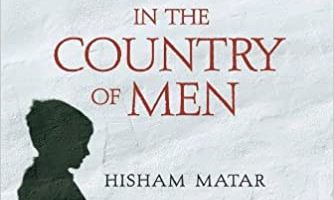Sudha Devi Nayak
‘In the Country of Men’, the debut novel of the Libyan writer Hisham Matar that was nominated for the Booker Prize 2006 and the Guardian First Book Award, has also garnered a few other international awards. Written in lucent, mellifluous prose, the book set in the late ‘70s in the picturesque city of Tripolis in Libya, with its sun and sea, (“The sky, the Sun and the sea were painted by God in colours we could all point and say the sea is turquoise, the sun banana, the sky blue…”), talks about the tyrannical and revolutionary regime of colonel Muammar-el Quaddafi.
In the charged political landscape of the times, everybody was expected to be a votary of the revolution and the bunch of dissidents who questioned the rightness of its beliefs were mercilessly dealt with. The novel lives in a small boy’s perspective of the world he is living in; in disturbing, unsettling times.
For nine-year-old Suleiman, life is circumscribed within the comfort of a well-to-do and loving home and his friends playing in the hot Sun on the pavement outside their homes and looking at the mulberry trees. He believes in his innocence that mulberries were the best fruit God has created and these trees were planted by angels. Yet, he senses the unrest all around.
He gets a glimpse of his father’s clandestine activities he is unable to understand and he experiences with horror and disgust his mother’s addiction to drink to forget the unhappiness and humiliation she has endured since girlhood.
He’s privy to all her secrets –the denial of love and independence, a marriage to a much-older man who does not understand her sensitivities. She struggles with her demons of despair and depression. But, in moments of sanity, she’s able yet to give love to her son and husband.
Meanwhile, the Revolutionary Committee weeds out liberal thinkers and dissidents as traitors to the regime and Suleiman sees his neighbour and best friend, Karim’s father Usthath Rashid, a respectable university professor rounded up by the revolutionaries. His interrogation on the television channels and his brutal treatment and humiliation and his subsequent execution are graphically exhibited. After the execution, simply chillingly, “Everybody seemed happy”. Suleiman is left wondering why nobody questioned or intervened and he begins to lose faith in the goodness of men.
Next, there is a raid on his own house. They are under surveillance and his father goes into hiding, his books are burnt and finally he goes missing. The family is taken care of by his father’s friend Moosa, and fearing the worst as a desperate measure, Suleiman and his mother approach a sympathiser of the Revolutionary movement, UsthathJaffer. Through his mediation, his father, after denouncing his political convictions, returns a mental wreck, a monster who is afraid to see his face in a mirror and afraid to face his son. Suleiman understands the “dark art of submission.” Moosa, served with a letter of deportation, leaves for Cairo; and Suleiman’s parents, afraid for his future, send him off to Cairo to be with Moosa; and this, to his utter bewilderment. He leaves in extreme sorrow to a strange land, alone, on a flight missing the two people he loved most. “I suffer an absence, an ever-present absence, like an orphan not entirely certain of what he has missed or gained through his unchosen loss.”
Suleiman grows up to become a pharmacist and there is a file in the embassy in his name for evading military service in Libya. The intermittent calls from his mother keep him informed of their life. After 15 years of his coming away, his father is rearrested on charges of embezzlement. He dies one month after his release, a few days after the ban on Libyans travelling abroad is lifted, never seeing his son.
Having been denied the presence of his son in his life, he looked after his friend Kareem. In this context, Suleiman says, “Perhaps the world is fair and balanced; after all, no one gains, no one loses; or, no one gains and everyone loses equally.”
The book ends with the poignant reunion of the mother and her son in Cairo. Hatar raises universal issues of oppression, hate, cruelty and loss that are overcome by the resilience of the human spirit and humanity that infuses all relationships — parents and children, friends and neighbours with an endurance born of love.
